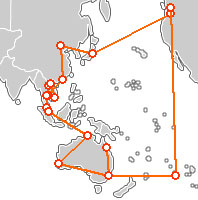things we are told as a child
 a few days ago i learned an unfortunate truth about expressions that we causally say and it left me shaken up - i realized that sometimes, expressions are not as superficial as they may sound.
a few days ago i learned an unfortunate truth about expressions that we causally say and it left me shaken up - i realized that sometimes, expressions are not as superficial as they may sound.while i knew that fairytales and other such bedtime stories have deeper meaning to them, i never gave that much attention to expressions that we say. they sound silly and they are meant, mostly, to gently quiet the person we are talking to. i am not referring here to proverbs; simply to what appears to be mindless expressions.
so, here is how a small part of my world came tumbling down.
i have recently started to read david bergen's the time in between, a story about the disappearance of an american soldier after his returned to vietnam years after the war. in one of the passage in the book, charles, the american, asks his chauffeur, thanh, how he survived the war. thanh tells his story and explains that surviving after the war was harder than surviving the war itself. in his opinion, surviving hunger in the reeducation camp he had been placed in was the biggest challenge.
to illustrate this, thanh tells the story of hien, a fellow camp mate.
One night he heard Hien, his neighbour, chewing quietly on something. Hien was weak and small and, during the day, was expected to dig up large roots with a small wooden spade. Thanh tried to help him, but it was difficult. The guards were not sentimental and disliked one prisoner helping another. Thanh touched Hien's back in the dark and whispered, "What are you eating? Be more quiet, or you'll be heard."
Hien stopped chewing, but later in the night, Thanh heard him again. In the morning Thanh noticed that the tip of Hien's finger was missing. Hien had eaten it. That day, Thanh caught a small snake and crushed its head with a shovel. He carried it back to the camp and tried to share it with Hien, but Hien refused. Again, at night, Hien chewed at his hand. Madness settled in like a fog. Thanh did not know who was mad, he or Hien. During the day Hien wrapped his hand in a dirty cloth and during the night he ate. The hand became bruised and swollen. Thanh told Hien to go to the clinic. Hien laughed at him.
as soon as i finished reading this passage i had a flashback to sitting at the kitchen island at my dad's apartment, complaining about being hungry. i was told, as a joke (as many kids are told)
mange ta main
garde l'autre pour demain
and then it hit me. there's nothing funny about that expression*! we say it so harmlessly, without thinking that there are people truly starving out there. i am sure that there has been, at some point in time, a case of at least one person consuming their own limbs out of hunger. and it is terrifying that we could say such things so easily. this joke, with the cruelty, mixed with all of the underlying implications just made me feel terrible and i started to cry.
i will never, ever say that expression again. and i will always feel pain if i ear someone else utter these terrible words. hunger and despair are no laughing matter.
______________
* literal translation: eat your hand, keep the other for tomorrow.





0 Comments:
Post a Comment
Note: Only a member of this blog may post a comment.
<< Home